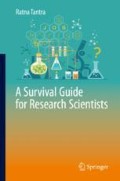Abstract
Over the course of your research career, it is wise to diversify your talents—that you learn other subject areas (apart from technical matter) to develop soft and transferrable skills. This will subsequently make you more employable. One of the things that you should try to learn and master is project management. By learning the skill set to be a good project manager, it will enable you to successfully deliver scientific projects and can pave the way for you to become a full-time science project manager (should you decide to do so in the future).
The goal of this chapter is to provide you with a conceptual background on the topic of project management and to define:
-
1.
What a project is and what project management is all about.
-
2.
The skills that you will need, in order to become a good project manager.
Although I will start the chapter by giving you a broad overview of this vast topic, I will be ultimately focusing on the practical aspects, particularly the three key elements that will make you a good project manager, namely:
-
1.
How to deal with people.
-
2.
How to deal with problems.
-
3.
How to manage time.
Access this chapter
Tax calculation will be finalised at checkout
Purchases are for personal use only
References
Armstrong, M. (2013). How to manage people. London: Kogan Page.
Baguley, P. (2008). Project management. London: Hodder & Stoughton.
Barker, S., & Cole, R. (2009). Brilliant project management: What the best project managers know, say and do. Upper Saddle River, NJ: FT Press.
Cooke, H., & Tate, K. (2011). The McGraw-Hill 36-hour course: Project management. New York: McGraw-Hill.
Forsyth, P. (2013). Successful time management: Creating success (3rd ed.). London: Kogan Page Ltd.
Gido, J., Clements, J. P., & Baker, R. (2017). Successful project management. Boston, MA: Cengage Learning.
Gilman, H. (2013). You can’t fire everyone. London: Portfolio Penguin.
MacDonald, J., & Tanner, S. (2012). Successful people skills in a week. London: Teach Yourself.
Manser, M. (2012). Project management in a week. London: Teach Yourself.
Mathis, B. (2014). Prince2 for Beginners: Prince2 study guide for certification & project management. San Bernardino, CA: CreateSpace Independent Publishing Platform.
Pries, K. H., & Quigley, J. M. (2012). Total quality management for project management. Boca Raton: Taylor & Francis.
Young, T. L. (2006). Successful project management. London: Kogan Page Ltd.
Author information
Authors and Affiliations
Rights and permissions
Copyright information
© 2019 Springer Nature Switzerland AG
About this chapter
Cite this chapter
Tantra, R. (2019). Project Management. In: A Survival Guide for Research Scientists. Springer, Cham. https://doi.org/10.1007/978-3-030-05435-9_16
Download citation
DOI: https://doi.org/10.1007/978-3-030-05435-9_16
Published:
Publisher Name: Springer, Cham
Print ISBN: 978-3-030-05434-2
Online ISBN: 978-3-030-05435-9
eBook Packages: Chemistry and Materials ScienceChemistry and Material Science (R0)

